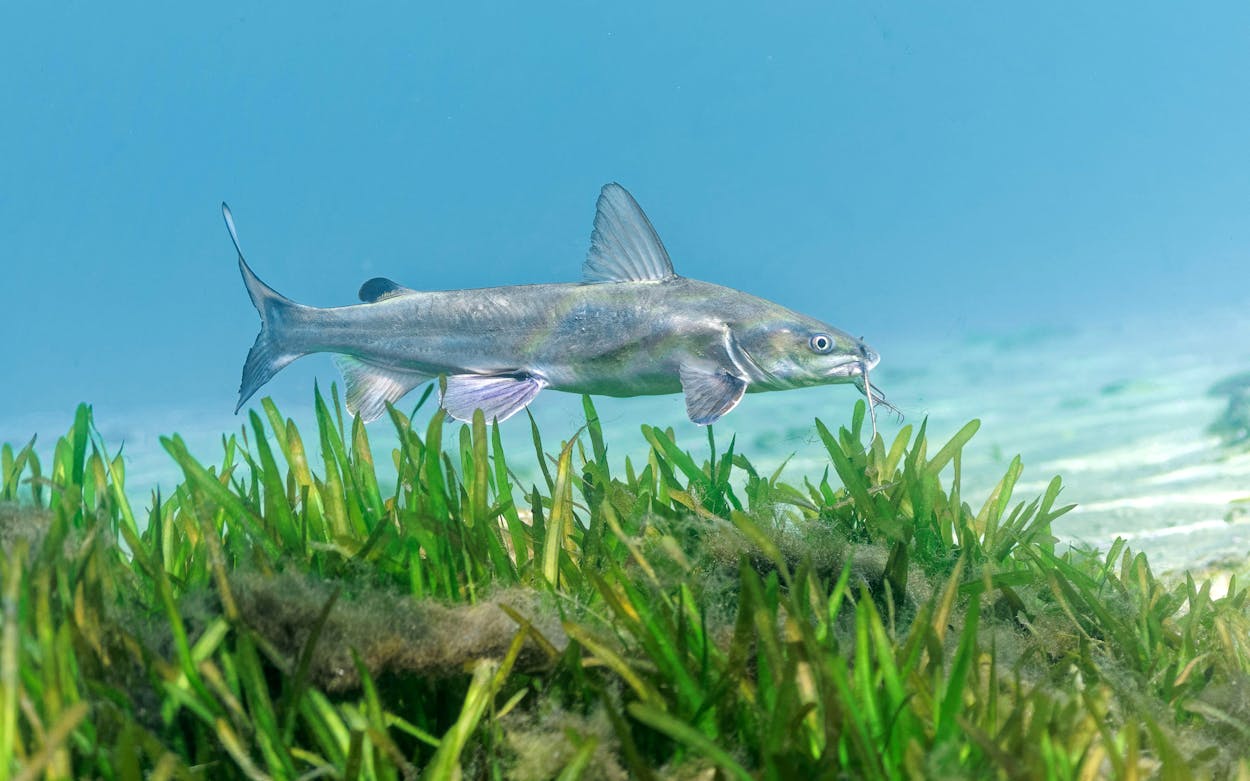In the current of public opinion, it seems the sea catfish is always swimming upstream. Indeed, both marine catfish species that populate the Gulf of Mexico—the gafftopsail (Bagre marinus) and the hardhead (Ariopsis felis)—are maligned by Texas anglers. Their meat isn’t as good as that of their freshwater brethren, they’re covered in a disgusting slime, and they have toxic barbs on their spines that inflict painful, lasting stings. The hardhead is particularly despised, not for being stubborn or anything (in fact, the name comes from a big bone at the top of its head), but because it’s everywhere—the most common catch in many areas along the coast—and yet considered a “trash fish,” i.e., a catch whose only real value is in being turned into bait for something bigger.
Maybe the hate is warranted, but I suspect the animosity may have a more clichéd origin: jealousy. While we in this country are stuck debating the merits of paternity leave, sea catfish are out here displaying a more progressive approach to childcare. You see, sea catfish are iconically good dads, so selfless in their parenting that they make Michael Keaton’s character in Mr. Mom look like Jack Nicholson’s character in The Shining.
Both the hardhead and gafftopsail catfish are mouthbrooders. Mouth brooding may sound like a synonym for pouting, but it in fact refers to the practice of protecting offspring by storing them in, you guessed it, the mouth. That’s right: sea catfish dads incubate fertilized eggs in their mouths until the spawn are strong enough to survive in the sea on their own. This can take as long as two months, a period in which these daddies eat nothing. (If my dad doesn’t eat something for even half a day, he’s hangry as hell!) Even after the eggs hatch (again, in their dads’ mouths), Papa holds on to his little miracles for another couple of weeks until each larva absorbs its yolk sac and strikes off on its own.
Other known mouthbrooders include certain betta fish, cichlids, and jawfishes. “It’s a way of ensuring a good hatch and protecting your offspring until they’re able to fend for themselves,” says Mark Fisher, science director for the Texas Parks and Wildlife Department’s coastal fisheries division (and yes, he’s heard that joke before). “For most fish, there’s very little parental care. In many species, there’s none at all. So this is an evolved method of protecting your offspring.”
Evolved indeed! Enlightened, even. Moms lay the eggs, then wash their fins of the whole ordeal, going about their merry lives with no question over whether or not women can truly have it all. For humans, the idea of a man being in charge of childcare has long been so implausible it’s inspired many a cinematic farce. For sea catfish, it’s nothing special, just a run-of-the-mill spawning period.
If you’ve never seen a photo of a mouthbrooding fish, you are missing out. The sight resembles that of the winning participant of a “chubby bunny” contest just before they gag on all the marshmallows. These daddy day care icons protect their children at great personal cost. Not only are they unable to eat, but they also have to aerate their babies, every so often spitting them out and sucking them all back in again. My brother-in-law will sometimes throw my niece really high into the air and catch her, which she loves, but his success rate would be much lower if he were tossing up twenty more of her siblings at the same time.
One thing anglers seem to resent so much about sea catfish is their abundance. It’s hard to avoid them on the Texas coast, and they’ve earned the nickname “tourist trout” because they are so easy to catch that even a beginner can do it. But if you consider its huge population as evidence of Darwin’s theory at work, the sea catfish’s evolved, enlightened approach to childcare has made it fitter, and it has survived. Sea catfish spines may be toxic, but their offspring’s childhoods won’t be.
- More About:
- Critters








